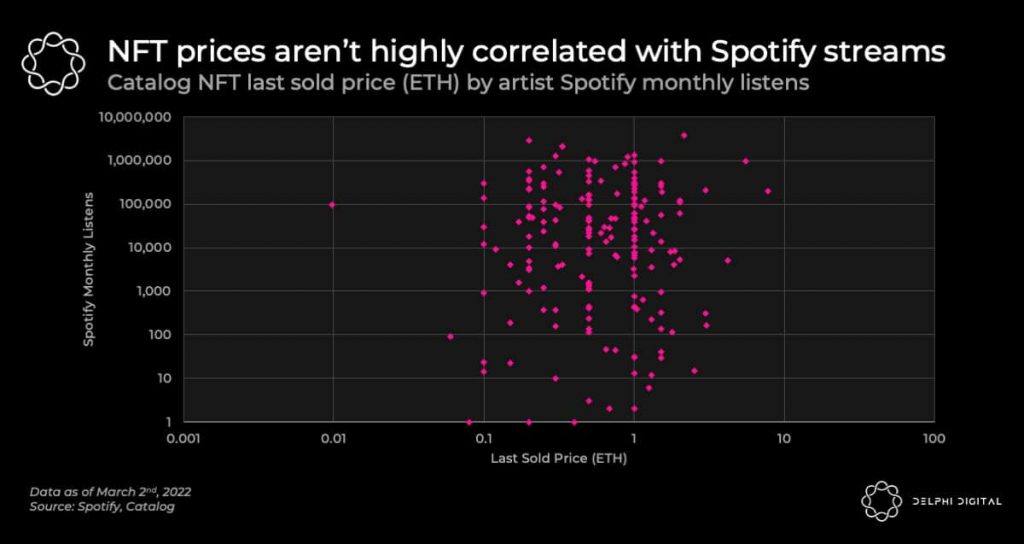An outstanding number of independent musicians have actually leveraged music NFTs to sustain on their own terms. Do you think someday all musicians can make a living without depending on major record labels? We hope so!
Iman Europe for example, an unsigned singer-songwriter from L.A., California who made 22.2 ETH (almost $60,000) by selling 5 singles and a music video as NFTs according to a recent article from Bloomberg. In comparison, she only made roughly $300 a month from streaming on multiple platforms such as Spotify and Apple Music, noting that she already has 4 million listeners across these platforms. However, streaming platforms mostly distribute huge cuts of the revenue back to record labels and distributors. Only a small percentage goes to artists.
✨BIG ANNOUNCEMENT!!!✨
i have officially launched my token-gated website powered by @telliesite! 🤩
if you hold any of my @soundxyz_ NFTs, you now have backstage access to my music career + unreleased tracks! my way of saying thank you.💜 check it out!https://t.co/uaeQeDtbCc pic.twitter.com/l3xPuGdX9P
— iman. (@ImanEurope) March 23, 2022
Another example is Daniel Allan, a moderately successful artist, whose songs got millions of plays in 2020—only received a few hundred bucks a month from streaming, which required him to take on jobs like mixing and mastering other artists’ music to pay the bills. But over the past half year, Allan has turned to a different model that allows him both financial and creative freedom: NFTs. With the pandemic keeping Allan at home and unable to make money from playing live concerts, he has been selling digital copies of his electronic pop songs as NFTs for thousands of dollars each. He spent months cultivating relationships with NFT enthusiasts, built a community of devoted fans online and then leveraged this popularity to raise 50 ETH ($140,000 on the day of trading) through Mirror.xyz in a one-day campaign to crowd-fund his upcoming album, Overstimulated. In exchange, backers get to enjoy 50% of Overstimulated’s master royalties.
It’s been three months since the @viamirror crowdfund that changed my life.
Today – I’m happy to share that Overstimulated is live.
We’re celebrating the launch with a special $OVERSTIM airdrop for collectors 🦋 pic.twitter.com/5c3MAw3vPv
— Daniel Allan (@imdanielallan) January 7, 2022
Haleek Maul, a Barbados-raised rapper who sold 9 works on Catalog for a combined 133.6 ETH ($299k at the time of writing). Maul has sold the top 8 highest-priced pieces on Catalog, mostly ranging from 10 ETH to 25 ETH. The sales from Maul’s INNER EP (56 ETH, or $256k at the time) would translate to 58.7M Spotify streams. Interestingly, Maul’s following on Spotify and Twitter were relatively modest (about 4k monthly streams and 8k Twitter followers), but the artist has leaned hard into web3. Doomsday, a VC-backed production company that crowdfunds music videos via NFTs, has been working closely with Maul with the goal of winning a video Grammy.
‘BICYCLE’ SOLD FOR 10ETH TO @1confirmation 💪🏾 https://t.co/Qa4W06SZ7v
— HALEEK MAUL (@HaleekMaul) March 8, 2022
Hundreds of musicians are following Iman, Allen, and Haleek’s steps into this world. On the NFT music platform Catalog, 140 artists have sold over 350 records for more than $1 million combined. The goal of these NFT-based musicians isn’t to top the charts, but to push technological boundaries and earn a decent living outside of the record label system, which has dominated the music industry for decades.
Songcamp, a collective founded in March, has hosted songwriting camps for dozens of previously unconnected songwriters, with those new creations selling for thousands of dollars on Catalog. The songs then received both visual treatments from artists and accompanying narrative stories in their public rollouts.
Major industry players are also dipping their toes into the space, hoping to not get left behind. Warner Music Group has a partnership with Genies, a company that creates digital avatars and wearables. The Grammys are selling NFTs. And Universal Music Group is hoping to strike gold with their Bored Ape Yacht Club band KINGSHIP, featuring primate characters from the incredibly popular NFT collection. (Read the full story here)
It seems that music NFTs are the way forward. Delphi Digital recently reported that artists’ popularity on Spotify doesn’t really affect NFT sales on Catalog. From the chart below, sales tend to revolve around 1 ETH regardless of artists’ Spotify streams. This shows that collectors are willing to support less-established artists in Web 3.0.

Make sure you check our blog regularly and follow us on Instagram for more NFTs and music marketing-related updates.
Subscribe To Our Music Marketing Newsletter!
News about music marketing strategies to the music business and beyond.
Delivered to your inbox once a week.





